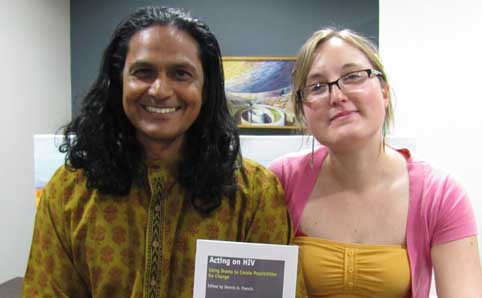Latest News Archive
Please select Category, Year, and then Month to display items
12 January 2024
|
Story Nonsindiswe Qwabe
|
Photo Sonia Small
 Since joining the UFS in 2008, Dr Grey Magaiza has worked extensively on approaches that can foster the socio-economic transformation of societies.
Since joining the UFS in 2008, Dr Grey Magaiza has worked extensively on approaches that can foster the socio-economic transformation of societies.
“The future should be one where communities can decide on their development agenda and futures. That’s the most important for me.” Dr Grey Magaiza, Deputy Director of the Centre for Gender and Africa Studies (CGAS) and Head of the Community Development programme on the Qwaqwa Campus, is passionate about capacitating communities to be agents of change and advancement. His vision for the future emphasises the empowerment of communities to take charge of their development by actively participating in decision making and the implementation of development projects that can improve their lives.
Since joining the UFS in 2008, Dr Magaiza has worked extensively on approaches that can foster the socio-economic transformation of societies. Over the years, he has crafted his research speciality into one that he is most proud of – being an interdisciplinary scientist immersed in the development of communities.
“I’m in a fortunate position of researching what I like. I say ‘fortunate’, because I’ve taken the time to understand what I’m passionate about, which is the overall field of rural livelihoods and livelihood futures – in short, community development. My research starts from an engaged university, understanding the elements that a university must use to enhance transformation and relevance to its immediate community in terms of development.”
One of the ways he has done this is by looking at social entrepreneurship as a development approach for young people in a rural setting. Through workshops with non-profit and civic organisations in Qwaqwa, Dr Magaiza has been helping these organisations to map out their needs and actively meet them through the involvement and support of external role players.
“We understand that communities are part of the national development agenda, but even that national agenda respects community knowledge and intentions and allows communities to shape their identity. A critical enabler of this is community organising. You bring back the capacity in communities to have dialogues on issues affecting them as spaces for engagement, knowledge exchange, and for people to just talk about their way forward.”
By enabling communities to define their development agenda, they can address their specific needs, challenges, and aspirations, he said. “When I look at livelihood futures, it’s quite an exciting aspect of my work – it’s like looking into a fortune tellers’ globe, because you’re not deciding for communities what they should do, but the communities themselves take those decisions.”
New book looks at ways in which to tackle HIV-challenges
2011-11-29
 |
|
Prof. Dennis Francis with Marjorie Human who designed the cover of the book, Acting on HIV.
|
The HIV pandemic has brought out the best and worst in humans in terms of response. On the one hand it has prompted stigma and violence and on the other it has brought about constructive and supportive responses from various individuals and groups. A new book, Acting on HIV, edited by Prof. Dennis Francis, Dean of the Faculty of Education at the University of the Free State, looks at how drama can be used to promote vital social change as well as individual behavioural change.
Acting on HIV offers a systematic inquiry into drama as an approach to discuss HIV/AIDS and related attitudes and behaviours. The book is a scholarly text and includes the work of some twenty exceptionally creative authors. Contributing authors to the book include, amongst others, Proff. Hazel Barnes (University of the Witwatersrand), Rob Pattman (Stellenbosch University) and Yvonne Sliep from the University of KwaZulu-Natal.
“This project started in 2009 and has taken much of my time to bring together the work of exceptionally creative authors. The research that is communicated through the book is original and timely and makes a significant contribution to conversations about the role/s and significance of drama in addressing issues of HIV & AIDS,” says Prof. Francis.